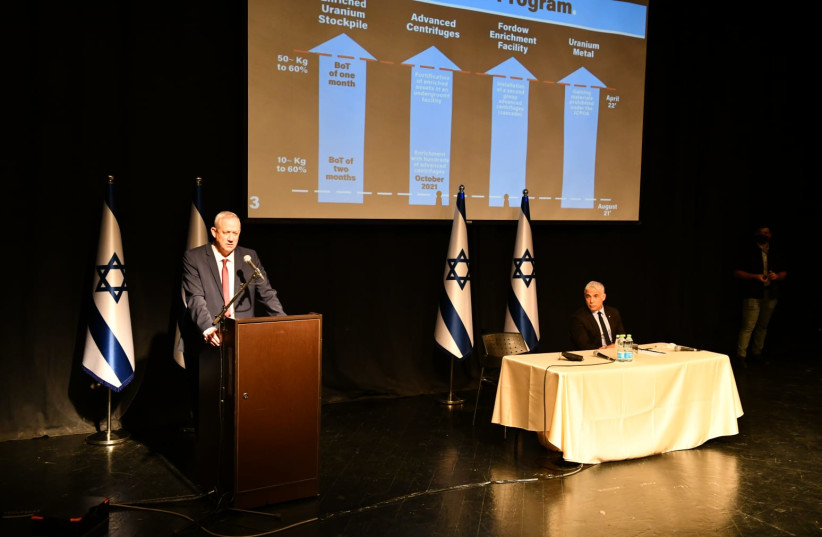A flurry of statements from the Biden administration opposing Iran’s demand to remove the Islamic Revolutionary Guard Corps from the US Foreign Terrorist Organization (FTO) list, as part of nuclear talks, looks like a win for Israel – but it may be much less than it seems.
Israel’s leaders were operating under a different strategy than former prime minister Benjamin Netanyahu did when it comes to an Iran deal. Prime Minister Naftali Bennett and Foreign Minister Yair Lapid viewed Netanyahu’s tactic of launching a major public campaign against a deal as ultimately ineffective, since then-president Barack Obama entered a deal with Iran in 2015 that was widely viewed in Israel as dangerous. Instead, they tried to work with the Biden administration to reach a more favorable deal for Israel from the Iran talks, even if it did not mean stopping the deal entirely.
In late February, when it seemed like the US and Iran would return to the Joint Comprehensive Plan of Action nuclear deal within days, Bennett let the public know about several new demands Iran had made in the nuclear talks, including removing the IRGC’s FTO designation.
Bennett, Lapid and others mentioned the IRGC delisting just about any time Iran came up. They chose to be louder and more public in the ensuing weeks – except for a Ukraine war-induced lull – about the IRGC than they had about other elements of the Iran deal.
Ambassador to the US Mike Herzog spoke out against it in meetings with US officials and legislators over the past six weeks. Bennett’s diplomatic adviser Shimrit Meir spent much of last week in Washington, meeting with US National Security Advisor Jake Sullivan and others to discuss Iran.

There were already voices in Congress opposing delisting the IRGC. US House Majority Leader Steny Hoyer and Minority Leader Kevin McCarthy expressed that view to The Jerusalem Post on a visit to Israel in February. But while Meir was still in Washington, it looked like the efforts began to pay off with the Biden administration.
Asked whether the IRGC is a terrorist organization in an interview last Wednesday, Blinken answered, “They are.”
Then, during a hearing in the Senate, Chairman of the Joint Chiefs of Staff Gen. Mark Milley said: “In my personal opinion, I believe the IRGC Quds Force to be a terror organization, and I do not support them being delisted from the Foreign Terrorist Organization List.”
On Friday, State Department Principal Deputy Spokeswoman Jalina Porter said US President Joe Biden shares Milley’s “view that IRGC Quds Forces are terrorists, and beyond that we aren’t going to comment on any of the topics in the nuclear talks. But what I would say is out of the 107 Biden administration designations in relation to Iran, 86 have specifically targeted the IRGC-related persons as well as affiliates.”
A day after that, Washington Post columnist David Ignatius reported that Biden “doesn’t want to budge” on the IRGC’s terrorist designation, which he views as separate from the nuclear file.
That seems to add up to a win for Israel, Bennett and Lapid – and perhaps personally for Meir, who can showcase her effectiveness after facing some ugly palace intrigue within the Prime Minister’s Office.
The IRGC delisting is only Iran’s latest demand, and on its own, it would only be winning a battle, not the war, over the Iran deal. Israel opposes the JCPOA, viewing it as paving the way for Iran to enrich uranium with an international imprimatur and allowing billions of dollars to flow to the Islamic Republic and, therefore, the IRGC to wreak havoc across the region and the world.
Late last month, a senior Israeli official said Israel’s vocal opposition to removing the IRGC’s designation was not just a “poison pill” for nuclear talks. However, Jerusalem’s win will be even greater if Iran treats its demand like an ultimatum and will not enter a deal with the US.
That being said, there may be hope yet for the Iran deal boosters. In the very same Ignatius column in which he said Biden does not want to delist the IRGC, he also said the administration is willing to continue nuclear talks with Iran and is looking for alternatives via the European nuclear negotiators that could satisfy Tehran.
A bit of Talmudic parsing of some of the recent statements from the Biden administration shows that it may be Israel and other opponents of the IRGC delisting that are being played with an alternative to what they actually want.
Milley and Porter both referred to the Quds Force, one of five branches of the IRGC, which specializes in unconventional warfare and military intelligence and supports Hamas, Palestinian Islamic Jihad, Hezbollah, the Houthi rebels in Yemen and others. And Porter added that 86 “IRGC-related persons as well as affiliates” have FTO designations. The only one who referred to the IRGC as a whole was Blinken, and that was in response to a yes-or-no question.
It’s unclear whether Congress would buy removing IRGC sanctions while keeping them on the Quds Force, lifting much of the political pressure on the administration. And beyond that, the door on Iran talks is not yet closed.
Whether the latest on Iran and the IRGC is, in fact, a win for Bennett’s and Lapid’s tactic of talking to, rather than yelling at, the Biden administration remains to be seen.
